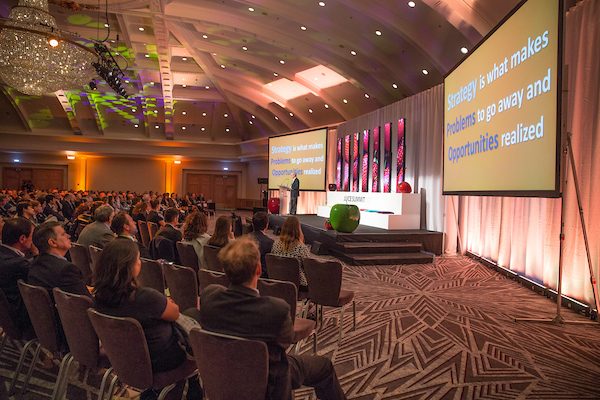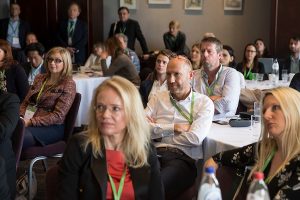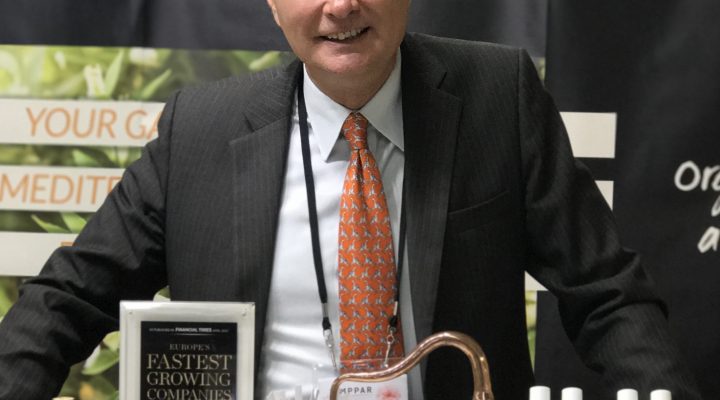One man’s vision to connect smallholder fruit farmers in Nicaragua with conscientious consumers in export markets worldwide, through organic and sustainably produced dried fruits, puree’s and fruit juices.
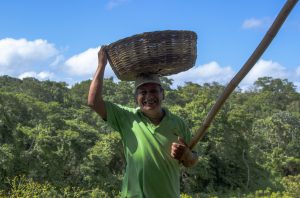
With virtually no job prospects and limited educational opportunities in rural areas and with almost half the population living on less than USD1.00 per day, Nicaragua is the second poorest country in the western hemisphere. Breaking the cycle of poverty is almost impossible for small farmers trying to simply exist let alone compete in the global market place.
Will Burke, founder and CEO of Sol Organica, the parent company of Sol Simple and Burke Agro, had other ideas. There must be a way to bring economic and educational opportunities to marginalized communities while simultaneously protecting and utilizing the country’s natural resources?
“I envisioned starting a fruit company, but not just any fruit company. I wanted to provide education and training to farmers, operate the plant using renewable energy, and support communities by employing single mothers.” Says Will.
In 2007 Sol Simple was founded to provide the commercial face of Burke Agro’s dried and pureed tropical fruit products and juices business and to form the important bridge between global export markets and the Nicaraguan farmers.
Here Will Burke talks to Fruit Juice Focus about how it all started and how his unique social enterprise model has helped provide market based solutions for poverty alleviation.
Fruit Juice Focus (FJF): Can you tell us a bit about your personal background in the fruit industry and how you came to set up Sol Organica?
Will Burke, Sol Organica (WB): I started out in education as a teacher and my first experience of Nicaragua was when I took up a teaching post here and it was here that I met my wife, also a teacher. After a couple of years working in Nicaragua and then back to the US for a spell at graduate school in Boulder, Colorado we ended up in Venezuela, teaching at the American embassy school. After six years experiencing what we felt was the deterioration of the country under Chavez we decided it was time to move on.
We asked ourselves, do we want to continue in education? Or do we want to move back to Nicaragua where my in-laws were living and start up a social enterprise, giving back something to the country through education or a business?
We brainstormed ideas and my wife reminded me of a moment when walking on the beach in Nicaragua a few years prior we saw thousands of mangos just rotting on the ground. We thought back to our days in Boulder, which is really the capital of natural organic food products in the US, where people were regularly paying USD15.00 per pound for organic dried mangos. And we thought how sad it was that these growers with all this product didn’t have a connection to that market and what a missed opportunity it was.
We started researching organic dried mangos as an idea and reaching out to Non-Government Organisations (NGO’s) and development agencies in Nicaragua, getting the lay of the land. I met a couple of growers, looked at my savings, drafted up a business plan and spoke to a couple of people in the market and thought ‘this idea might have some legs’. Long story short I invested, and we set up the company.
We moved back to Nicaragua and started up a fruit drying plant to dry organic fruits. I identified and organised small growers, transitioning them from conventional farming to organic farming using my educational skills. I chose to work with single mothers which, as well as furthering gender equality, also worked from an educational viewpoint. One of the best ways to give children the opportunity to go to school in third world countries is to ensure that their mothers are employed and that they have control of their income so that they would make sure that their children were educated.
We introduced renewable energy into the process by importing solar collectors that can heat air through solar power which is part of the environmental impact we were looking to achieve. An additional impact was the transitioning of the small growers from conventional to organic farming. The idea was to educate them, improve their yield, give them a niche market where one didn’t exist for them before and improve their livelihoods as a result.
So that was the DNA of the company and it started with dried fruit.
Within two years we realised that there is more to the tropical fruit world than dried fruit, so I started investing a little bit in pulping equipment to get into the juice business. In our dried fruit operation, we were experiencing bottlenecks depending on how many dryers we could fit in the limited space we had. I realised we could process a lot more volume in this space by expanding into the juice business and simultaneously improve our social impact. And that’s how the business evolved into juice.
FJF: What difficulties did you face in the early years of the business and how did you deal with them?
WB: I didn’t meet with any real opposition, but we were certainly going against the grain in terms of working with organic production. When we started the plan was that the NGO’s, government institutions and development agencies would support me by helping to identify growers and work with us to provide training for them in the transition from conventional to organic farming. And initially they were committed to it. But at that time Nicaragua was going through a political upheaval with the arrival of the newly elected Sandinista government six months after we started the business. The result was that very quickly the development agencies were subject to a freeze on spending and the funding dried up. Any funding that remained was either focused on certain regions in the country or were not focused on organic agriculture and couldn’t help us out.
So, we had to do it on our own, and I was out there in my truck identifying more and more growers and integrating them into our system and then working to transition them from conventional to organic farming. In time we were able to hire our first agronomist to take this on as his own project which was a big step forward.
Another hurdle was the dried fruit market. The real issue was that we were selling dried fruit in bulk and with us being a small operation, the costs were too high, and we couldn’t compete on price
To combat this, I decided to develop a brand, Sol Simple, that would become the face of our company positioning us a brand that whilst more expensive than other products, reflected our commitment to organic principles and our social and environmental impact. This brand was born from need but has worked incredibly well for us and today we remain the only company processing fruit and certainly the only company in organic fruit production in the country.
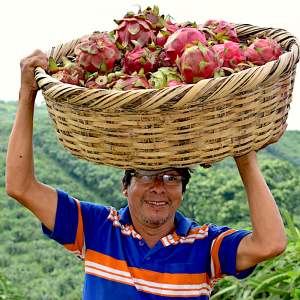
FJF: Can you tell us more about your move into the fruit juice and puree market and the products you produce.
WB: Our main focus is pitahaya puree or red dragon fruit puree – which is pitahaya with the ‘h’. Whereas pitaya without the ‘h’ is white pitaya. Pitahaya is indigenous to Nicaragua and Central America with Nicaragua being the largest pitahaya producer in the region and the largest organic producer in the world. This is primarily due to the market that we have been able to develop with our partners, having planted and harvested more and more pitahaya over the years as a direct result of having been able to transition more and more growers into organic farming from conventional farming. So that is our number one product and we have been able to make a name for ourselves through that.
Meanwhile we have been really focused on passion fruit juice and developing the value chain and finding key customers that want to partner with us and who are willing to stick to a fixed price for the long term in order to create market stability. This allows us to plan ahead on the production side and look to increase our customers’ use of passion fruit as they then have the ability to project years in advance what the ingredient cost will be. That means we will be able to grow organically with them and provide a sustainable market for our small growers. Everybody wins.
And I think that needs to be the case for most fruits and in agriculture in general – especially when you are talking about small growers because if they don’t win nobody wins in the end. Small growers deserve a dignified livelihood and raw material prices need to provide that for them. And once they have that it provides for a stable market.
FJF: How do you manage your collective of 700 or more small growers? How do you ensure they maintain the standards that you require and deliver the products on time?
WB: We dedicate a good proportion of our budget to our field programme. We have nine agronomists out in the field on their motorcycles everyday giving workshops, doing farm visits and working on financial literacy. We go through everything from planting to pest and disease control, to how do you manage your farm as a business and we have developed a curriculum that underpins this.
We have also designed systems for our 700 or so small growers organising them by collection centres within their communities. These collection centres create a central dry place where the grower can come when we schedule pick up to collect their harvest and provides the food safety and hygiene that we need.
At each collection point there is a committee that is part of the internal control system. This committee will also act as the auditors for other collection points meaning that they will visit another community, going from farmer to farmer reviewing and auditing their paperwork. The committee for the collection point being audited will in turn audit another collection point in the same way and so it goes on. This means committees are not self-auditing but auditing other communities they don’t know which promotes integrity.
The system works, and they respect it that way. With organic agriculture you need to ensure that no one is trying to pull the wool over your eyes. If one grower cheats, then everyone loses. They take it very seriously and we take it seriously. In addition, we are audited. it’s a ‘ride along audit’ from the local agricultural department. Every Monday a representative from the ministry of agriculture rides along with us visiting the farmers and checking their production registries.
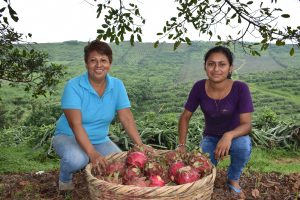
FJF: Do you still get involved on the ground with the social and environmental issues of the business and how is the company structured?
WB: Culturally the Nicaraguans aren’t really used to a non-hierarchical system especially when they need to think on their feet. They prefer to talk to their supervisor and then that supervisor comes to talk with me so there is still an element of the hierarchy system even though we have been trying to get away from it.
We are a company of 250 employees and we have had a board of directors since the onset of the company – it’s a three-member board and I am the president of the board and I am also CEO of the corporation.
I am certainly still in weekly meetings and making decisions as needed but as we’ve grown I have been able to delegate quite a bit. It’s always important to hire people that are smarter and more agile than one’s self and I think we have done a good job in identifying people who want to be part of the mission and want to get out there and make a positive impact and be more comfortable with the responsibility they carry.
FJF: How does your production and distribution work? What sort of infrastructure do you have in place?
WB: We own all the infrastructure, all the packing materials – although sometimes we co pack for food service, retail packs, and for frozen products where typically our customers own the packing material and we warehouse it for them.
But we own all the equipment and most of the packing material like drums along with the land, the offices, warehouses and the trucks. Sometimes we outsource refrigerated containers when we need more frozen storage. The plant has two lines. A juicing line and a puree line, with each of those lines having a capacity to produce a container every day and a half whether it’s mango puree, pitahaya puree, pineapple juice or passion fruit juice.
FJF: How have your destination markets evolved over the years with regards sustainability and social impact issues?
WB: Our main market is North America, but we have a deep connection with Europe.
In the early days I wasn’t able to get much support from NGOs but the Dutch have a really good training programme through their agency CBI, which is a European export coaching programme. I enrolled in the three-year course and it proved to be a great success helping us form good contacts in the business. It has allowed me to look at Europe not only as a real sustainable market but also as an opportunity for us to diversify into and adapt to the different tastes and different requirements.
Europe is more up to date when it comes to fair trade and that’s an opportunity for us. Americans are a lot less knowledgeable about what fair trade is and what it means and why it should be supported whereas Europeans are much more savvy.
So that’s an opportunity in terms of niche markets for us because frankly we are more expensive than most of our competitors as we don’t necessarily deal in commodities. We offer a lot more added value. What we see in the US and in Europe especially, is that more and more buyers and the brands themselves and the bottlers, want to get closer to the source of supply for a lot of reasons. One is for food safety and transparency and traceability. The other is that more and more consumers want to know where their products are coming from. They want to know the source country, what kind of farmers are growing the fruit and what they are buying. And the brands are having to respond to that.
There are many more brands now that have started out with a social mission and are growing incredibly fast but are finding that there is a lack of companies like Sol Simple that provide the authentic connection to a grower. We now have people seeking us out who are elated when they see that we provide sustainability reports and that we partner with local government institutions and NGO’s and can demonstrate that we are actively improving livelihoods. These brands need a sustainable source and to be able to report to their shareholders who want to see a positive social impact and a positive financial return on their investment.
FJF: What do you see as the next phase in the Sol Organica story, and how do you see the future of the Nicaraguan fruit industry?
WB: That’s the sixty-four-thousand-dollar question! It’s a mixture of many things. On the one hand it’s more of the same as we have an excellent model. We do want to diversify into other fruits and their respective purees and juices. Pitahaya is number one, and we believe passion fruit will be number two and we are heavy in mango – especially dried mango and primarily we’d like to develop those markets even more because there is still idle time on our equipment.
As we grow we do see opportunities in Central America in natural beverages and we see opportunities in maybe providing add-on services like pre-blended products. We are already packing for food service and retail and are very good at that. We are also looking at Individually Quick Frozen (IQF). We’ve run trials on IQF and had positive responses but don’t own IQF equipment and would have to look at the investment costs for this. IQF is when you buy a bag of frozen blueberries in the supermarket they are IQF frozen blueberries. They are not frozen together in a big block whereas 20 years ago they were – nowadays they are individually frozen which improves the quality.
Most importantly, we are actively working in regenerative agriculture, which focuses on soil health and carbon drawdown from the atmosphere. It’s a non-politicized movement that everyone should get behind because it can be simply framed around improving water shed and soil management by planting more cover crops to increase top soil depths, rain water peculation, preserve fungi communities, and minimize soil runoff that we witness in the increasingly common heavy rains. Whether organic or conventional, it improves yields and livelihoods as a result.
Also, we would like to see more of a formal market for fruit in Nicaragua. One of the reasons that fruit in Nicaragua can be a little more expensive than fruit in neighbouring countries is because it is not industrialised yet. There is not enough consumption locally to create that formal market so what happens is we buy everything from our growers – grade A, B and C as there is not enough fruit planted. We are looking to get into organic fresh fruit exports because that way we can add more value for the grower by paying them more for the fresh quality fruit and paying them less than we currently pay for the second and thirds. It will help create the environment where our fruit juice processing company and our fruit juice is more competitive because the raw material is less expensive.
FJF: How is the company performing financially?
WB: This year we are projecting USD5million in revenue. We had some heavy rains which have affected some of the harvest which may result in us coming under that. We have a growth plan to hit USD20million in sales by the year 2020. And that’s not that far away!
FJF: How do you see the future of the fruit juice industry?
WB: It’s all about the Millennials! Those born between 1981 and the early 2000’s. People’s pallets are evolving. And through globalisation more and more products, especially exotics, are being made available. Social media is helping to spread the word about these different and interesting fruits and juice products like pitahaya, lychee, or soursop/graviola. More exotic unknown fruits have more opportunity today than they did five, ten years ago, because of those conditions and I think that the millennials play a good part in that they are always curious. They have sophisticated pallets they like to spend their money on food and on the experience. They have the social mindset so it is a really good opportunity for a company like ours and we are still trying to figure out how to engage more closely with that demographic because we think that they can really contribute to the social environmental and impact and help us grow our mission.


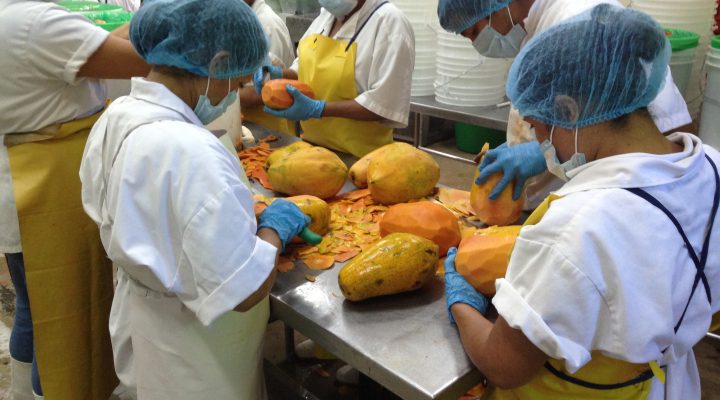
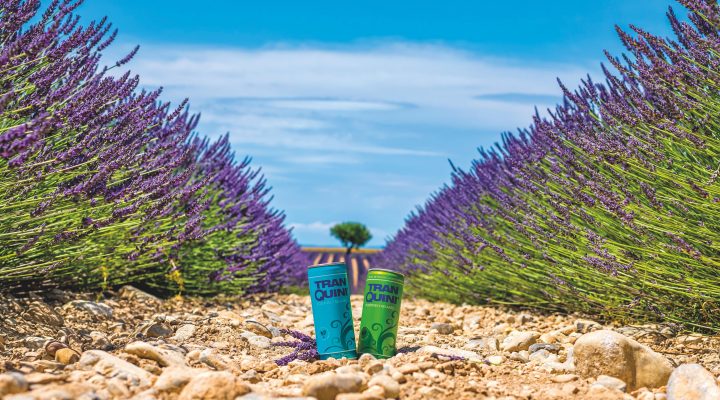
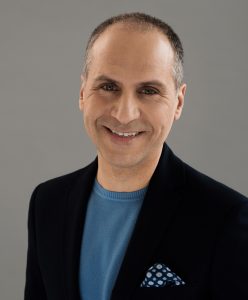 Ahmed Elafifi, Tranquini (AE): I started my career at Proctor & Gamble in Cairo 1991 followed by the Henkel group in 1992, responsible for brand management and sales. In the mid-nineties I moved to the beverages sector and to the Coca Cola company. In total I worked for more than eleven years in the Coke organisation. For the first part I was in central marketing, returning several years later to manage the very big and vibrant Coca Cola business in Poland where I was Chairman and Managing Director of the bottling plant managing over 3000 staff and revenues of Euro1bn. This was my last job before I founded Tranquini.
Ahmed Elafifi, Tranquini (AE): I started my career at Proctor & Gamble in Cairo 1991 followed by the Henkel group in 1992, responsible for brand management and sales. In the mid-nineties I moved to the beverages sector and to the Coca Cola company. In total I worked for more than eleven years in the Coke organisation. For the first part I was in central marketing, returning several years later to manage the very big and vibrant Coca Cola business in Poland where I was Chairman and Managing Director of the bottling plant managing over 3000 staff and revenues of Euro1bn. This was my last job before I founded Tranquini.